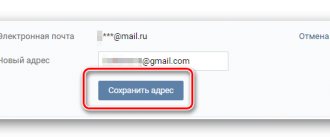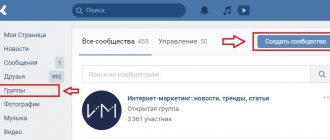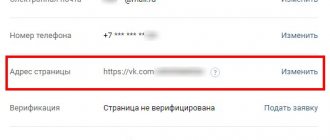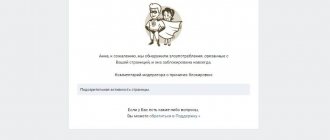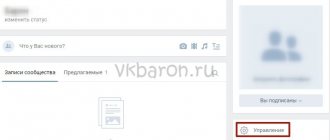Test your worth
The most common reason for a Wikipedia page to be removed after review is that it lacks significance.
The harsh truth is that your brand is not nearly as popular as you think.
I have no doubt about the importance of Ahrefs. We have created perhaps the most popular suite of SEO tools, and almost every professional in the field has mentioned our company at some point.
What is your main paid SEO tool? (if there are several, choose the one you use most often)
— Rand Fishkin (@randfish) December 17, 2019
In addition, two of our main “competitors” already have pages on Wikipedia. So, it would seem, we shouldn’t have any problems getting our page.
And yet, this is how the review of my first article ended:
Translation:
Application rejected on May 18, 2021 by Sulfurboy .
The application's sources do not demonstrate that the subject matter qualifies for a Wikipedia article—thus, they do not demonstrate significant coverage (not just passing mentions) of the article's subject matter in published, reliable secondary sources independent of the subject matter. Additional sources that meet these criteria must be added before resubmitting the application. If there are no such sources, the subject is not suitable for Wikipedia.
So it took some serious effort even for us to gather enough good sources to meet the significance criteria.
And you already know how it ended. Some editors felt that the sources were quite good, but others considered most of the sources to be unreliable due to their association with the marketing and SEO industry.
So how do you know which sources are best to use?
What does Wikipedia mean by significance?
The page about the significance criteria that applies to companies says the following:
An organization is generally considered significant if it has been the subject of significant coverage in reputable independent secondary sources. Superficial or incidental coverage of a topic in secondary sources is not sufficient to establish significance. All information must be such that it can be verified. If independent and unaffiliated, reliable sources cannot be found on a certain topic, then Wikipedia should not have an article on that topic.
A number of terms require detailed explanation, since even some well-known sources do not necessarily meet the specified criteria.
For example, you probably know many brands that have a section on their home page with logos from famous sites like Forbes and Entrepreneur where that brand is mentioned:
I'm sorry to disappoint you, but this doesn't necessarily mean that the brand is automatically relevant to Wikipedia. Many of the pages on these sites are user-created or sponsored. This disqualifies them from being acceptable sources for Wikipedia.
Let's take a closer look at the requirements put forward to the source so that it is clear why this happens:
- Authority - Information must come from generally recognized reliable sources. This includes most journalistic and academic sources, books from reputable publishers, and most industry-leading blogs and platforms that use proper editing mechanisms.
- Independence - the source must be unbiased. I will just note that your clients are regarded as persons related to your business. Thus, many reviews and guidelines do not meet the criterion of independence.
- Secondary - the source must include the author’s own thoughts, assessments, interpretations, analysis and synthesis. For example, the original study and its reprints are primary sources.
Since anyone can publish articles on Forbes or Entrepreneur, they often fail to meet the criteria for authority and independence unless such articles are written by members of the editorial team.
In addition, there is a criterion for substantial mention.
We have links from reputable sources, but most of them are just passing mentions, such as this:
Source.
The Wikipedia consensus is that a citation is considered significant if at least two paragraphs are devoted to the topic of your article in the source. The more the merrier, and the best thing is an article devoted entirely to it. Here is an example of such a source in our case:
Source.
How to quickly assess significance
Make sure the first two statements are true, and ideally all three:
- Your company stands out from the crowd of similar ones
- There is a lot of information about it in reliable and independent sources
- Your company is mentioned in “red links” scattered throughout Wikipedia
Your company stands out from the crowd of similar ones
This is the first and only condition of significance and has nothing to do with sources. Something ordinary does not deserve a separate article in the encyclopedia, since it does not differ from the rest of the “gray” mass. This wiki essay uses local businesses as examples, but the idea could easily be extended further.
Just read this comment from the discussion about the fact that the Ahrefs page was removed:
Translation:
Remove is a run-of-the-mill SEO company. SEO by nature is a business prone to messing up and being messed up, especially when combined with paid editing. SEO and paid editing are two species from the same family of pests that are ruining the Internet. (I'll skip the rest of this rant.) Robert McClenon
What is the conclusion? Having the largest commercial web crawler and developing a search engine is not enough to stand out from the crowd, according to some editors. I don't think other industries face the same bias, but I still encourage you to make sure that your company is truly special in some way.
There is a lot of information about your company in reliable and independent sources
It's impossible that you don't know about mentions of your brand on the most famous news sites, such as The New York Times, The Wall Street Journal, The Guardian or the Financial Times.
If at least one article appeared on these types of sites that talked about your brand in detail, such an event would be worth celebrating. It probably won't be difficult to find other valid sources to link to on your page.
Your company is mentioned in “red links” scattered throughout Wikipedia
Another indicator of the presence of a significant brand is its mentions on Wikipedia itself. These mentions are often marked in red, which means there is no page about the brand yet.
For example, on the French page about backlinks there is a mention of Ahrefs:
If you click on it, you will be taken to the article creation page. This is because Wikipedia encourages the creation of pages on the topics identified in the "red links". Why? To be as good as possible, Wikipedia should contain information about everything that is mentioned in it.
If you don't know how to find these red links, search for them on Google. Simply combine the search operator site:wikipedia.org with your brand name in quotes. Google will return all Wikipedia pages that mention your brand.
Naturally, it will also return links from your articles, so you will need to discard them. In our case, it turned out that there were several red links to the topic “Ahrefs”, but none of them in the English Wikipedia.
A red link in a French article might help us validate our relevance on the French Wikipedia, but it's of no use in the English Wikipedia. This is because Wikipedia articles in different languages are separate entities (you can read more about this below).
How to create an article on Wikipedia
We have figured out what the word “Wikipedia” means and briefly examined the history of the resource; now let’s discuss the question of how to add information to Wikipedia.
registration on the site
To create an article on Wikipedia, you need to register your own account in the service. You can perform this procedure through any page of the site. To do this you need:
- Click on the phrase “Create an account” located in the upper right corner.
Step 1: Create a Wikipedia Account
- Fill out the registration form.
Step 2: Create a Wikipedia Account
- Confirm your email address, which will receive a letter containing a link to confirm your email. This step is optional, but we recommend that you do not ignore it, because without confirming your email, the system will not send you a new password if you forget the old one.
Creating an article
You can also create an article on any resource page. To do this, you should enter the name of your future article in the search bar located in the upper right corner and then click on Enter or on the search icon.
Creating a page on Wikipedia - checking the future article for uniqueness
If this topic does not yet exist, you will be taken to an editor that gives you the opportunity to create a new page on Wikipedia.
Creating a Wikipedia page - going to the editor
In this editor, you form the structure of the article and visualize it using bulleted and numbered lists, sections and tables. All relevant options for text formatting are located in the line above the title.
Creating a Wikipedia Page - Editing Panel
In order to fill out the table located to the right of the text, you need to insert it into the text.
Creating a Wikipedia page - selecting a table
To publish an article, click on the blue “Create Page” button located in the upper right corner.
Creating a Wikipedia page - the final step
We have given an explanation: what Wikipedia is and how to write an article on it. Elementary - isn't it? In fact, this is a big misconception. Since this information does not answer the question: how can a person get onto Wikipedia and, most importantly, ensure that your material is not deleted after a couple of hours. This process has countless pitfalls. Let's figure out how to write Wikipedia articles correctly.
Find sources that validate your worth.
The chances of you being lucky enough to have an excellent source or red links are, frankly, slim.
If, like us, you have neither of these, follow these recommended steps in order. This is the most effective way and will save you from wasting time searching for sources that may not even exist.
- Look for significant mentions of your brand on donor sites
- Look through books and magazines
- Look for brand mentions without links
A. Look for significant mentions of your brand on donor sites
The most effective way to find relevant sources is to look at your site's backlink profile. To do this, paste the site's address into Ahrefs' Site Explorer, then go to the Referring Domains . There you will see all the sites linking to yours, roughly sorted by popularity.
Search the list for popular news sites, magazines, and top industry sources. Once you've found what you're looking for, click the dropdown in the Links to target column to see the individual links, then check their context.
The source shown above looks promising as it contains information about our company. And there is a possibility that there will be at least two paragraphs about our brand and products. To verify this, just go to the page itself and check its contents.
Note.
If you're unsure whether a given source is right for you, check Wikipedia's consensus on popular sources.
If your brand is mentioned in passing in the source, you will easily understand it yourself.
If you cannot find a single good source among the backlinks, then most likely you do not meet the criteria of significance and there is no point in continuing this process further. Then read this section about what to do in such a situation.
B. Look through books and magazines
If your company may have been mentioned in books or magazines, you should definitely pay attention to these sources.
Since there are countless books on marketing and SEO, and our software is very popular among experts in the industry, this is exactly the case for us. Unfortunately, we couldn't find any first-hand references because we don't have many of the books. Instead, we used the Google Books service.
If you follow our recommendations, simply go to Google Books and search for your brand name. The search will return all books in which it is mentioned, along with fragments of text.
This is not much, but these mentions can be taken as the basis for the text of the Wikipedia page.
Note.
I know of several books that mention our brand but are not listed on Google Books. If you encounter the same situation, then either purchase the book or randomly try downloading free book excerpts from Amazon.
As for magazines, I would advise using the most reputable and popular catalogues. I used JSTOR during university and Wikipedia recommends it too.
To be honest, I didn't find anything useful for Ahrefs on JSTOR. I've had better luck with other magazines, but after a quick look at the articles, they didn't seem to be suitable sources for marketing and SEO topics. I studied marketing as part of my specialty, and I have to say that many academic articles about it are far from reality. Consider this for your industry.
In addition, some sources may be so-called predatory journals that do not meet the criteria of reliability and independence.
I think it's best to stick with JSTOR and not waste time looking elsewhere.
B. Look for brand mentions without links.
I would only advise doing this if you feel you are missing just one relevant source, as it requires finding a reference without a link.
Google search operators can help here. Just insert the addresses of news portals, magazines and blogs along with your brand name:
This is quite a labor-intensive and time-consuming process, so let's speed it up with Content Explorer from Ahrefs.
Content Explorer is a database that contains information on more than three billion web pages, providing the ability to search with operators and filter results.
In my case, I wanted to find all mentions of "ahrefs" other than those contained on our site.
Use the "-site:" operator to exclude results from your site.
I got over 250,000 results:
Unfortunately, there is no way to filter only good sources for Wikipedia, but we can use filters to narrow down the sample range.
First, let's select active pages in our language, since these are the only ones that can be linked to on Wikipedia.
Second, let's limit the sample to "reputable" sites. To do this, we will use the Domain Rating (DR) metric, which reflects the authority of a site’s backlink profile. Relevant sources for Wikipedia tend to have a fairly high domain rating, so I'll set the filter to: DR≥70.
Finally, we'll check the One page per domain and enable the Highlight unlinked domains to highlight results that don't contain links to our site.
We've already looked for links on donor sites before, so now we're only interested in sites without links. To export the results, just click the Export and check the Only pages with highlighted domains box:
Here's what the data looks like in Google Sheets, sorted by DR:
We've reduced 250 thousand pages to just 174 domains. You can now easily comb through the Content Title and Content URL manually to find relevant sources for Wikipedia.
What to do if your brand doesn't meet Wikipedia's requirements for relevance
First of all, there is a high probability that you will not be able to satisfy the existing criteria. If you submit an article and it gets scrapped, don't try it again until you can improve the page and sources for it. The number of rejected attempts is recorded, so you may regret it later, when your company has become undeniably important.
This article is not about how to outsmart the system. I spent a lot of time reading Wikipedia's rules to make sure I did everything fairly.
Therefore, you should not put up with your lack of importance. There are two ways to increase it:
Strengthen your PR campaign
Getting featured in major publications is one of the most challenging marketing challenges for organizations. Your options and opportunities vary greatly by industry. Usually the determining factor is a combination of the following points:
- A unique product.
- Revolution in the industry.
- Actions of the owner to build a brand and CSR.
- Link-worthy content.
- Famous employees and faces of the company.
- Active monitoring and use of opportunities in the field of getting into the media.
It's also worth noting that not all media coverage is created equal.
Let's say you created a great infographic with data that caught the attention of journalists. You can get links from the sources you want, but they probably won't be useful for creating a Wikipedia page. The reason is that the main focus of the article will be on your content and not on the company itself.
I would suggest consulting with a PR professional if you're serious about beefing up your PR campaign and don't know where to start. This is work for the future, which is intertwined with strategy and brand management.
Try creating Wikipedia articles in other languages
Does your business have roots in a non-English speaking country? Then it is likely that your activities will be covered more in the local media than in the international ones.
The principles of significance are the same throughout Wikipedia, but the criteria vary by language. If you are a startup in Silicon Valley, it will be much more difficult to make it relevant than a startup in the Czech Republic, the country where I come from.
It `s naturally. The number of reliable and independent sources is proportional to the number of native speakers. Solid coverage from two good sources will probably be enough for a company in the Czech Republic, although it will not be enough for a company in the USA.
This concludes the hardest part of creating your page. It will be easier later.
How to get on Wikipedia and why it is very difficult to do
As you might have guessed, this article is not only about how to create a Wikipedia page, but also how to do it in a way that will keep it there.
Creating your own Wikipedia page is the holy grail for many companies and members of the media community. There are a lot of reasons for this: a nice snippet, 1st place or at least TOP-10 in Google and Yandex results in accordance with the search query. Don't forget that Wikipedia has long used the rel=”nofollow” attribute on all external links in order to prevent them from being counted in search engine rankings. However, in most cases, when you create your Wikipedia page, you'll be up in searches in almost a matter of hours.
What is Russian Wikipedia? It certainly seems that the owner of such a platform, the independent Wikimedia Foundation, in Russia receives carte blanche to resolve controversial political and commercial issues. Judging by the reaction to the recently released video by video blogger Maxim Katz, the majority of Internet users consider the information on Wiki to be significant, justified and useful in the moment.
We at the digital agency "Prostudio", in turn, remembering the miracles of influencing the mass perception of information - take, for example, telegram channels in Belarus and the Russian Federation and the existence of Overton Windows, we decided to check how incredible it would be to add pages to Wikipedia advertising nature, what are the statistics of publications and the time of deletion of such articles. What is the difference between publishing in a brazen manner (90% chance of deletion) and in an article incubator. And how can an individual or company get onto Wikipedia?
It is obvious that the politics of inclusionism (the philosophy and ideological movement followed by Wikipedia contributors) has not been popular on Wiki in recent years.
We also found answers to the most important questions:
- Which topics are moderated faster?
- Should you publish your page several times and what should you do if random users delete it?
- Does it make sense to buy other people's Wiki accounts?
How much does a “paid” Wikipedia account cost and is it possible to bypass moderators before publication, pointing out obviously controversial points in all the rules of the encyclopedia and numerous violations by the administrators of the ru.wikipedia.org project
How to add an article to Wikipedia about a person? Wikipedia is a swamp, and when you get into it head over heels, it’s worth remembering that you can’t get out of there “clean.” The crux of the problem lies in technology like Confluence and GitHub - changes to any Wikipedia page will persist over time. The contribution of any participant is visible to the entire community, and therefore obvious. Here, even working with IP proxy services was once considered controversial, but in general, the rules of Russian Wikipedia are similar to those around the world, but with some reservations.
Diagram of page popularity in the English version of Wikipedia
Firstly, in the English Wikipedia, unlike the Russian one, there are almost no living people. Some are bots that automatically work with pages. People in the West have something to do besides virtual life and have money for it. The project in Russia often plays on people's feelings of self-importance. He presents “badges” and distributes regalia.
This is also where people often make mistakes. Both moderators and “patrollers” (the final group of “experienced” decision-makers - arbitration). An example of a not entirely successful attempt at “publicity” is the presence of a wiki moderators’ chat.
The wiki moderators' chat is necessary to discuss administrative issues related to the resource. Any administrator can access it.
One of the main disadvantages of Wikipedia in 2021 is that it is free. And if you think that this is a huge plus for Russian “democracy”, do not rush to rejoice. Wikipedians are people too and they want to eat. And Generation Z is not particularly interested in writing articles on Wiki. The stupidest thing, of course, is to entrust the editing of Wikipedia pages to some 20-year-old intern. No offense to the TikTok generation, but there is a very low probability that there will be success. As for example in the case of Alfa-Bank.
Information about Alfa Bank on Wikipedia
Actual location of the Alfa Bank building
Despite the fact that the photo on the page of the Moscow bank for some reason is from an office in the city of Minsk, the entire Wikipedia community, instead of discussing the obvious mistake with the photo, on May 24, 2021, they discussed the renaming of Alfa-Bank to Alfa-Bank. With a small one, the main thing is that it is not advertising, despite the fact that the CBU in the photo is different - these are just details. By the way, uploading a photo to Wikipedia so that it is not deleted is a separate “attraction”.
By and large, the main problem of the project is complexity. “Dump” of links on the first lines of search engine results. It’s hard to say why everyone wants to go there.
And now the point. For 3 months (this is a good period for Wikipedia), we tried to publish a page from a well-known rating and our company itself. Having studied all the rules, and most importantly examples of successful publications for current categories of articles, links to authoritative sources and media, analysis in the visibility of WordStat. We thought, why not try it. After 7 days our article was deleted.
Search for Prostudio agency in Yandex
Information about Prostudio on Wikipedia
We have participated in many Runet rating competitions and won more than once. What prevents us from being published on Wikipedia? The first thing Wikipedians will point out to you and us is a violation of the guidelines governing the behavior of participants. It is practically impossible to follow all the rules; there will be a lot of them here and there are practically no regulations for their use anywhere, with the exception of this page. But the main question remains: how to post an article on Wikipedia without being deleted in a matter of days or hours?
We have put together a short test for you that will help you understand what your chances of getting into Wikipedia are.
Is there a chance to bypass the rules? Was there from 2010 to 2015
There is simply no ideal recipe for placement on Wikipedia right now. Even if you are the same agency that “agreed” with the majority of moderators who sum it up and deal with quick removal.
However, there were “dark” times between 10 and 15, where the power of the mass impact of technology was such that a huge number of advertising articles were formed. At some point they decided not to do anything with them (for an unknown reason to us) and not to mention the creators of the “fake news”. Also, we did not receive a clear answer to our questions regarding the violation of the 1st rule.
Correspondence with the Wikipedia administration
Articles that have been left are usually highlighted in blue. Red - deleted. The discussion of the article lasts a week. In this case, the result of the 10th year was summed up by “fake”.
Due to the “hellish” work of moderators, unbearable stupidity from the point of view of the advertising market, the complexity of the publication process, enormous government pressure on Wikipedia due to regional competitions, the ease of rolling back edits, we thought and decided to highlight the most important topics that have a chance to stay on the pages of the resource . Most of them answer the most pressing question of today: how to make a Wikipedia article about yourself?
Mom, I'm a musician
How to add an article to Wikipedia? The easiest way to break through all limitations is to be a significant character in the music world. The cheapness of this kind of article is due to the fact that pop performers grow on the stage like “mushrooms”, and the list of requirements for a musician is not as large as it might seem at first. In any case, the Article Wizard was created especially for you, dear Russian Wikipedians. And here is your threshold for entry and rules:
- Significance - importance from the point of view of the project and the personal opinions of the participants.
- Sources - publications in the media, we buy from Kommersant, RBC, Forbes (100k)
- Contents - an article with links to the number of published hits and albums. Avoid the phrases “best pop artist”, “golden voice of Russia”, “incredible rock-folk bass”, unless you have awards, a “gramophone” or a TOP 100 billboard - good luck to you.
There is also an example of the “venality” of Wikipedians. Thus, in the list of significant Wikipedia articles in 2021 there is an article about Klava Koka, the group T-Fest, Genvest and GAYAZOV.
Information about deleted singers on Wikipedia
Statistics of deleted musician pages from WikiRaccoon
Why do we consider this category “easy”? Firstly, the statistics from the WikiRaccoon member are above. The number of pages to be deleted is falling in 2021.
Secondly: pay attention to accounts for promoting the labels MoscowConnection or even MisterXS, which you can contact for any question and which you will find among those defending. At the same time, none of the moderators have a mark about paid edits or blocking.
It is also difficult to believe that adults, in all seriousness, help write articles about Adushkina Katya, Dana Milokhin, NILETTO and others for free. Just like the fact that you can make an article on Wikipedia on your own.
Dad, I'm an entrepreneur
We continue to “raise the bar.” The real pain of Wikipedia and the record holder for projects to be deleted, as well as KBU (quick deletion of articles with or without submission for discussion) is the section of the biography of contemporaries.
Every information businessman, IT company, senior manager, just a good specialist in his professional field, considers it his duty to write an article about his beloved self. And here, if you are not a tycoon who manages at least a branch with a multimillion-dollar turnover, with national and social significance, with hundreds of statements in the media (press releases do not count), and the state order “Knight of the Navel of Russia”, then there is no place for you on Wikipedia . You can prove to the administration as much as you like that you are making a useful contribution to the future of the state, but if you do not conduct real political activity, there is no chance on Wikipedia.
- Significance is a section of the biography of a contemporary, confirmed by references to facts.
- Sources - publications in the media, we buy from Gazeta, Lenta, Forbes (200k).
- The content is an article with maximum mention of work in concerns.
A strange life hack: Russian Wikipedia has an extremely difficult relationship with other language sections. If you open, for example, the category of famous articles about Armenian figures, you will find that most of them are designed very poorly, many of them are significant only at the regional level.
If you are historically significant for your country, and do business in Russia, you should take care of your public relations. It is quite possible that after a year or two of your active regional activities you will get to publication on Wiki. Estimated cost for publishing articles of this type: from 100,000 to 1 million rubles. This, by the way, is thinking about the question of how to create a Wikipedia page about a person and his biography.
My startup is the coolest
Let's move from personalities to companies. My favorite example of an absurd Wikipedia article on the topic of strangely significant endeavors is the article about. Fantastic discussion of the article, where people have been “hinting” to administrators for many years now that the level of trust in Wikipedia is now so high that business owners are actually selling their services through the article, even though it is objective from all sides.
For decades, people have actually lost money over a simple Wikipedia page. Thousands of people who “believe” in cryopreservation freeze the bodies of the dead in the hope of “reviving” them in a few years. Then they are “thrown away” for money, the article is asked to be deleted, but the imprint on the history of Russia is more important.
Information about cryopreservation on Wikipedia
The article about the “startup”, meanwhile, has been frozen from edits and is included in the “good” category. For startups that still want to make history, we recommend checking out:
- Significance - Look for similar articles in the organization category or project.
- Sources - publications in the media, we buy from specialized publications with TICs.
- Content - the article will be as short as possible, ratings are important.
As an example of the slowness of Wikipedia, it is worth mentioning that Yandex ordered articles about its new services from one of the participants marked “paid”. By the way, this particular moderator was blocked this summer.
Scientific research and ratings
How to create an article about yourself on Wikipedia? — This issue worries not only musicians, entrepreneurs or politicians; also many candidates, masters or doctors of science in Russia strive to ensure that their rating or research is present not only in numerous electronic libraries, but also on Wikipedia. Here the administrators played a cruel joke on non-scientific workers and created a page of “original” research (ORISS).
As for ratings, the criteria for the significance of any subject from the point of view of Wikipedia are more like an anecdote. For example, in the criteria for the significance of a website there are also such wonderful awards as ROTOR, Runet Award, Golden Site and Webby Awards.
The next condition: the site must be in the TOP 100 of global traffic according to the alexa.com service - Internet guru Neil Patel would twirl his index finger at his temple.
Ask your SEO specialist when was the last time he measured the success of your site using Alexa alone and most likely he will look at you with bewilderment. As for the rest of the ratings, it seems that their authors got onto Wikipedia in 2010 through the bed of its author Jimmy Wales. Just compare two completely identical arguments for digital awards. And try to evaluate the contribution of the participants yourself.
Information about the Runet Rating in Wikipedia
Information about Tagline on Wikipedia
We once told a long-known truth in the digital community about the Runet Rating. However, this truth does not reach all administrators in 2021. Suddenly it turned out that Tagline, which, by the way, is also subject to criticism from advertisers, is not well known.
But the competition from RAEC, where the page was created by fakes, has enough reason to be famous. We will skip the assessment of significance criteria, the price of sources and content. Your research or rankings simply don't stand a chance, even if you're a Nobel laureate.
Social Events
Wikipedia quite often bends the rules by introducing significant events. There are even articles about political statements, but the most fascinating case in 2021 is the “helium war” in Belarus. Out of boredom, Wikipedians scribbled out an entire article with signs, links to sources, and links.
Information about helium warfare on Wikipedia
Nevertheless, the article was deleted, but in order to respect the titanic work of the authors, a footnote was left. In general, on Wikipedia there are real chances to leave an article about events; they easily “go viral” in the media, which means they collect the required number of sources.
Probably, now we will get to the most interesting part, since it is the next section that is closest to the answer to the question of how to publish an article on Wikipedia and whether this is possible in principle.
Your chance - translated articles
Almost all the moderators who now patrol pages on Wikipedia and make decisions on articles are terrible hypocrites. The weight of their “contribution” can be assessed by reading just a couple of articles about Internet marketing.
Google translator has definitely “grown,” to say the least, as have the moderators’ complaints about the quality of the articles. You can evaluate how most of them received article editing privileges in the Wikireality project. By the way, these are not satellite sites, but very real facts that can be found in the history of any participant - that’s how Wikipedia works.
However, even if you are right and the moderator who deletes your article is dishonest, you are unlikely to prove anything by simply finding the participant’s biography in a Google search. Hazing “rules” Wikipedia, your arguments will be erased from the discussion, and hardly anyone will get to the history of edits, because many are too lazy to even look at the “article discussion” section. Here is an example of moderator Erokhin, who is still on Wikipedia.
Information about the moderator Maxim Erokhin
Participant Erokhin from the discussion above, at one time simply translated articles, and then opened his own black PR agency and is not blocked to this day.
Criteria for the importance of bloggers
How can a blogger write about himself on Wikipedia? Our favorite “case study” on Wikipedia is the page of the famous tech blogger Wylsacom - this is the personal page of the participant with a copy of the article, hidden from the index. Did you think he was a famous video blogger with a multi-million audience? Well, no, say Wikipedians and delete the author’s page on Wikipedia for the 8th time. The members don't even try to help Vilsa get the article done or acknowledge his importance.
Meanwhile, the page of the “singer” Vlad A4 Bumaga, which was put up for deletion 6 times by users, was returned. In order to support the participant who is engaged in video blogging, we provide a link to the moderator. We will skip the assessment of the criteria for their significance, the price and content of such articles. It’s easier for you to refer to the VP: VIDEO BLOGGERS rule, and in general you have a better chance than Vialsikom of staying on Wikipedia. Anti-case: the more often your page is deleted, the worse it is for you.
Blogger Wylsacom
Create a user page
Wikipedia is an openly collaborative project with a community of contributors, editors, and administrators. The only way to become a credible member of this community is to create an account associated with useful edits and other contributions to the development of the project.
In short, to be taken seriously, you need to register and create a Wiki user page. This is also necessary in order to communicate with other participants and disclose whether you have a conflict of interest (COI).
Yes, you read that right. Creating and editing content for your own benefit is discouraged for obvious reasons. While it's not illegal to submit a draft page about your company, you need to let the editors know that you have a CI.
And one of the places where you can do this is right on the user page:
Translation:
User: Mpecan
This user, in accordance with the Wikimedia Foundation's Terms of Use, declares that his contributions to Wikipedia have been paid for by Ahrefs .
Translation:
User: Mpecan
This user, in accordance with the Wikimedia Foundation's Terms of Use, declares that his contributions to Wikipedia have been paid for by Ahrefs .
Just use one of the templates and enter the name of your employer.
Strengthen your reputation
Take the time to improve Wikipedia in areas that are not related to your company page. Not only is this the right thing to do, but it will also improve your reputation and the chances that CI-based edits will be approved.
As you can see from my user page, I have listed the topics that I am interested in editing. I strongly encourage you to do the same and contribute to a few articles before submitting your page for consideration.
The less your edits are related to CI, the better. This will show other members that you take Wikipedia seriously and that your account was not created for a single purpose.
Strengthening your reputation in this way provides another significant benefit. At the same time, you will learn how to use Wikipedia's content management system (CMS), which will come in handy when it comes to creating your own page.
How to create a wiki post on VKontakte
Wiki post is usually used in long articles, since wiki design makes reading more convenient and easy to understand. The text is located in the center, and on the sides there are semi-darkened VKontakte interface elements. The reader concentrates on the article and is not distracted by additional excesses, which is what both the group leader and the user need. To create a quality wiki style post you will need the following elements:
1. Create a wiki page as described earlier. Please note that the page title is the title of your post. It is the title that is indexed by search engines first.
Once created, you can start writing text content. When writing an article or post, you must follow standard rules. Uniqueness should be high, the text should be readable and interesting, and the absence of syntactic, lexical, stylistic and grammatical errors is also welcome. All these points are very conducive to attracting readers.
2. Create an image. The picture is the first thing your VK subscribers will pay attention to, which means that you should pay great attention to creating a high-quality image. Knowing how to correctly create a wiki post in contact, you can choose the appropriate option for creating an image.
Let's look at the most popular image options provided for wiki posts:
- Image. The easiest option is to attach a photo. But this is somehow too common and simple and does not attract the current subscriber enough.
- Text combined with background. Text interspersed with the title of the article is a simple but attractive format where the emphasis rests on the title. If desired, you can attach an icon.
- Image with text. In this format, text can be superimposed on top of an image, which will immediately influence emotions and affect figurative perception.
- 50/50. The text takes up half the space, and the rest is taken up by the image. This type of image in a wiki post allows you to touch on imaginative thinking and concentrate on the title. Don’t forget that VKontakte wiki markup will be embedded in all pictures.
It is worth noting that a high-quality image should contain the following aspects: a title, a logo, an image or a bright background. It is also advisable to implement a community address and an “important” button or any other call to action.
You can use any editor to create an image. It is important to know that used images have little appeal to the modern reader. If your reputation is important to you, take the time to create a unique image.
Outline the content
Forget about how you usually sketch. The content of your Wikipedia page should focus on what your sources have information about. This means don’t add anything that you can’t back up with links later.
Remember that content based on three solid sources is usually better than content based on twenty less reliable ones. When there are many sources, editors may not be able to discern the best ones from the crowd.
I would also suggest using the structure of pages about other companies in your industry as a reference.
Draft the page
Think back to the Wikipedia articles you've read. They are all different from regular articles or blog posts.
When drafting your page, try to follow these five principles:
- Simplicity - Use simple sentences and avoid unnecessary jargon.
- Neutral tone - convey information, not emotion.
- Objectivity - Don't be biased and forget your usual marketing language.
- Verifiability - support your information with links to sources.
- Originality - do not copy text from sources word for word, but retell it.
Take these principles seriously. Advertising is probably the second most common reason for article removal, after lack of relevance.
Translation:
This application looks more like an advertisement than an encyclopedia article. Encyclopedic articles should be written from a neutral position and cite a range of published, independent, authoritative sources, not just material produced by the creator of the subject being discussed. This is important to ensure that the article complies with Wikipedia's verifiability policy and so that the significance of the subject matter can be determined. If you still believe that the subject is worthy of inclusion in Wikipedia, rewrite your submission to comply with these guidelines.
The best way to deal with this is to send your sources to a friend who will write an article on them with an open mind, and then publish it. If this option does not suit you, control your impulses and write the text with the interests of your readers in mind, not your company.
I was well aware of this when I wrote the Ahrefs page, but some editors pointed out a few passages that they felt weren't objective enough.
Note.
You can draft an article directly in the Wikipedia CMS—no need to do it anywhere else. Simply go to the sandbox and then copy the contents for submission.
How to write an article for Wikipedia - briefly
- Make sure there is no Wikipedia article on your topic
- Make sure the topic is truly meaningful
- Come up with a name in the nominative case and singular
- Each fact in the article must be substantiated and confirmed by authoritative sources
- Collect a database of reliable sources of information
- Begin the text with a preamble revealing the meaning of the subject of the article
- Write in a popular science style, without fluff and bureaucracy
- Maintain a Neutral Point of View
- Respect copyrights
- Structure the information: use bulleted and numbered lists, tables, break the text into sections
- Add photos, maps, drawings and sound recordings
- At the end of the article, be sure to indicate sources of information (section “Literature”) and links to sources (section “Links”)
- Specify article categories
- Provide interwiki links
- Please be patient - publication of the article may take more than one month.
The following two tabs change content below.
- About the author of the article
- Latest materials
Tatiana Loginova
Writing texts is my way to escape from the routine and worries of a mother of many children. I was inspired to learn to be a copywriter and here I am. Life needs to smile!)
Add formatting, links and categories
If you've completed the accompanying reputation building task, you should already be fairly familiar with how to work with the Wikipedia CMS. I'll just touch on a couple of points.
First, a template for a company information block:
To add it, click Insert -> Template -> Company:
Secondly, links to sources, the addition of which does not cause any difficulties. Wikipedia generates links based on the URL or ISBN number of a book.
Link details in Wikipedia.
However, the system does not always work perfectly. I have encountered some inaccuracies in the reference information. Be sure to double-check the data generated by Wikipedia and, if necessary, correct it.
Finally, it's a good idea to add categories to further tie your page into the rest of Wikipedia.
You can do this during the drafting stage, but category links must be disabled until the page is approved. It's easier to add categories after approval.
First you need to activate the option Settings -> Gadgets -> Editing -> HotCat:
Then simply add a category template to the end of your article by selecting this option:
Again, use categories from articles about other companies in your industry as a guide. Here's what I got:
Translation:
Categories: SEO Companies | Search robots | Search Engine Optimization | Web analytics | Singapore companies
Trying to fix hosting
Unfortunately, few people will choose a wiki engine for node.js; most webmasters will prefer what they have already dealt with, which is PHP, and besides, most existing hosting services are configured for PHP. And for node.js you would have to rent a VPS. I really wanted to make my product more accessible. The idea for wiki hosting came from Fandom. Wiki hosting would make my engine available to a much larger audience, and it would also make it stand out among hundreds of others (indeed, hundreds of cms for wikis alone). I wrote a ghost.sh script that raises a portal on a new domain (creates a working directory for the site, copies the default engine code into it, creates a database with a user and password, configures access rights for all this), and also added a link to cloud commander, which provides read and write access to files from the site's working directory. All that remains is to manually register the new domain in the DNS manager and add it to the launch in the main script. The hosting itself is still at the beta stage - perhaps the first clients will have some mistakes during the first launch. (In general, I have never had experience creating such a project as hosting before, perhaps I did some things incorrectly or poorly, but I started launching my first site on the engine (hosting site) and it works great, and I even uploaded it to updates).
Collaborate and make adjustments
Reviewing can take anywhere from a few hours to a few weeks. My first application was rejected a day or two after submission:
Translation:
Application rejected on May 18, 2021 by Sulfurboy.
The application's sources do not demonstrate that the subject matter qualifies for a Wikipedia article—thus, they do not demonstrate significant coverage (not just passing mentions) of the article's subject matter in published, reliable secondary sources independent of the subject matter. Additional sources that meet these criteria must be added before resubmitting the application. If there are no such sources, the subject is not suitable for Wikipedia.
What went wrong?
Apparently I made the mistake of adding too many sources that had little mention of Ahrefs. While they can be used for links, they do nothing to increase your relevance.
As I said above, you shouldn't expect reviewers to scrutinize all your references. Because of this, the most authoritative sources were simply lost in the mass of less significant ones.
Although I would still include a few minor sources. Their purpose is to reinforce information intended to make the text easier to read and to highlight some interesting facts.
The repeated application took much longer to undergo the review process. Shortly after submitting it, I received a follow-up question from an editor about CI...
Translation:
Comment: Seems significant enough, but isn't there a conflict of interest here? — Sagotreespirit
Comment: Thanks for checking. Yes, there is a CI, and I reported this in accordance with VP:OPL when submitting an application for creation. — Mpecan
...but after my answer the communication ended.
A few weeks later, someone else commented on my sources and some parts of the text that seemed to have failed to maintain a neutral tone. I thanked him, corrected the shortcomings mentioned, and finally, two months after submission, I received approval for the page.
No matter how good your submitted paper is, there is always room for improvement. Be prepared to actively interact with editors on talk pages and in comments. Although the criteria for approving applications is somewhat subjective, do not try to argue.
Even if the Wikipedia articles on some of your competitors are worse in every aspect, this is not a compelling argument for getting your page approved.
In the discussion about deleting the Ahrefs page, someone left a comment in our defense, and one of the arguments was about other SEO software companies that have approved pages on Wikipedia:
Translation:
Leave – Ahrefs is a well-known company in the SEO industry. It is no less significant than SEMrush , SimilarWeb or Yoast SEO . The SEO tools that Ahrefs provides are significant enough on their own to leave a page. See here, this recommendation in the list of the best SEO tools, other mentions on Moz or Google Keyword Planner, a detailed review on PCMag, and inclusion in the SEO Market Report. Greenminecraftdude (there are few or no other edits besides this topic).
Indeed, it is no less significant than Yoast, Moz, etc. I have already listed them for deletion in Wikipedia: Pages to be deleted/Moz (marketing software) and Wikipedia: Pages to be deleted/Yoast SEO. All of your links, except one (which I already took into account in the analysis above), lead to custom sources. The SEO industry is similar to the cryptocurrency industry. The only difference between them is that SEO has managed to metastasize on Wikipedia, while cryptocurrencies are still complaining that they are not allowed to litter it. Most likely, because SEO specializes in manipulating your presence on the Internet. TryKid
It only got worse. The discussion about our page turned to a discussion about deleting the pages of all SEO software companies. Some areas of business are simply not held in high esteem on Wikipedia.
How the free encyclopedia works from the inside
What is "encyclopedic content"? According to a rather vague definition from the Wikipedia administration, encyclopedic articles must describe certain generally recognized phenomena, the value of which for human civilization is confirmed by multiple citations on authoritative and trusted Internet projects.
Information in Wikipedia articles is necessarily confirmed by a large number of links to third-party primary sources.
- “You can’t just write an article on Wikipedia about your loved one in order to become famous and remain in history forever.”
- Meticulous independent editors and assessors of the Wiki community thoroughly check every fact and impostors are removed.
Before they write about you in the encyclopedia, you need to somehow “stand out” offline and online.
Wikipedia is not just an online directory, but a global community, a kind of collective intelligence. Although anyone can create, add and edit articles, in order to ensure the quality, reliability and trustworthiness of publications, there is an add-on of “accredited editors”, whose opinion carries great weight within the project.
Authorized editors ensure that no fake articles appear in the encyclopedia, and that the information presented is always reliable and up-to-date.
- Wikipedia is the fruit of collective labor
A large number of users work on each article. Frequent edits, improvements and additions continue for years. The result is a perfect information product without a hitch.
At the same time, all versions of each article are stored in the editorial archive and you can trace the evolution of each publication from the very beginning, conduct your own investigation, identify problem areas, even find trolls and authors of fakes.
It is worth emphasizing once again that every fact published in Wikipedia articles is confirmed by a link to a respectable third-party source.
Check your details
Even if your page is approved, that's not all. Some pages are more vulnerable than others to vandalism and inappropriate edits. This is the price that all open collaboration projects have to pay.
Be sure to keep an eye on your business information page to be notified when someone makes changes to it. Just check the required box when submitting an article or making changes to it:
Just keep in mind that you should only undo or edit those edits that cannot be supported by references. If someone adds negative information about your company that is supported by reliable sources, leave them alone. The content of the pages must remain neutral and objective.
I wish you luck with your editors.
Who writes Wikipedia
Wikipedia is the free encyclopedia. That is, anyone
willing. Administrative functions are also performed by volunteers, and their rights vary depending on their status. Statuses are ranked based on the quantity and quality of achievements and activity of the system participant.
In fact, ALL project participants follow all articles. Distortions of information in a particular article quickly become known within the community. As a result, the article may be rewritten more than once.
The “bold” advantage of such a control system is that every fact is questioned, repeatedly checked and confirmed by reference. But this also leads to the main disadvantage - work on an article can take months, and in the end it can change beyond recognition (or it will be deleted altogether).
Despite the size of Wikipedia, new articles are published infrequently.
69 articles per day from all over multimillion-dollar Russia. Not much. Even in little France they wrote more. And Vietnam surprised
